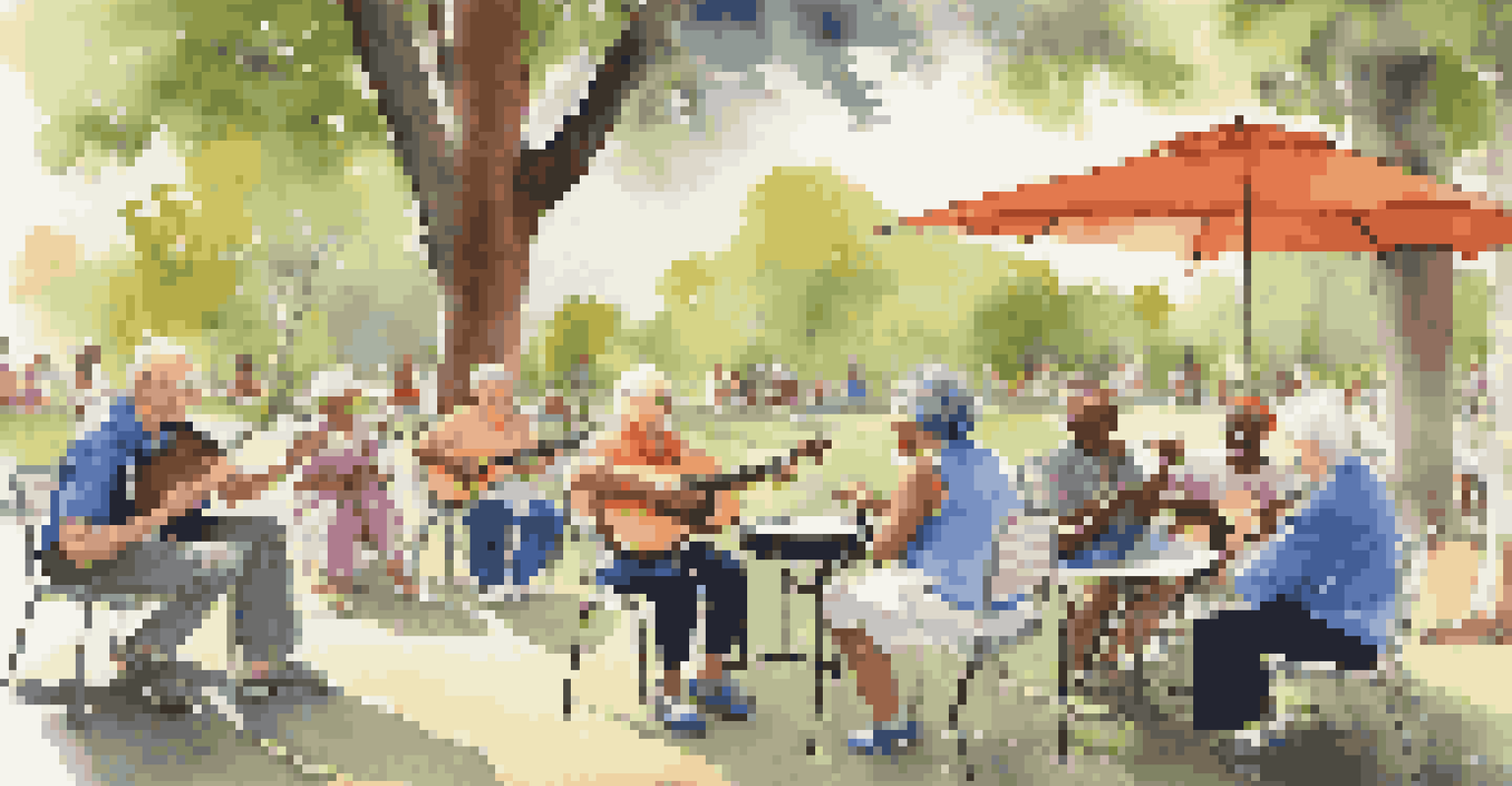Music and Aging: A Holistic Approach to Health

The Connection Between Music and Health in Older Adults
Music has long been recognized for its emotional and psychological benefits, especially among older adults. Studies show that engaging with music can lead to improved mood, reduced anxiety, and even lower levels of depression. The simple act of listening to or playing music can evoke memories and emotions, creating a sense of connection to the past.
Music can change the world because it can change people.
For many seniors, music serves as a bridge to their younger selves. It can transport them back to significant life moments, whether it's a wedding song or a tune from their childhood. This connection to memories is not just nostalgic; it can also enhance cognitive function and promote mental well-being.
Moreover, music can stimulate social interaction, which is crucial as we age. Group activities like singing or dancing can foster relationships, combat loneliness, and create a sense of community, all vital components for a healthy aging process.
Music Therapy: A Powerful Tool for Aging Well
Music therapy is an established practice that uses music to address various health issues in older adults. Trained music therapists use tailored interventions to improve cognitive, emotional, and social needs. This approach has shown remarkable results in managing conditions like dementia and Alzheimer’s, helping patients to communicate and connect with loved ones.

The therapy often incorporates familiar songs that can trigger positive memories, enhancing the quality of life for those affected by cognitive decline. These sessions are not just about listening; they may involve singing, playing instruments, or even songwriting, which can be incredibly empowering for participants.
Music Boosts Health in Seniors
Engaging with music can improve mood, reduce anxiety, and enhance cognitive function among older adults.
Furthermore, music therapy can alleviate physical discomfort, reducing pain perception. In a soothing environment, music can serve as a distraction, making it a valuable adjunct to traditional pain management strategies for older adults.
Physical Benefits of Music Engagement for Seniors
Engaging with music can have surprising physical benefits for older adults. For instance, rhythmic activities like drumming or dancing can improve coordination, balance, and even cardiovascular health. When seniors move to music, they're not just enjoying themselves; they're also exercising vital muscle groups.
The music is a reflection of the soul, and the soul is a reflection of the heart.
Moreover, singing has been shown to enhance respiratory function. The deep breathing associated with singing can strengthen lung capacity, which is particularly beneficial for seniors who may face respiratory challenges. It’s a fun way to incorporate breathing exercises into a routine without the monotony of conventional workouts.
In essence, music becomes a vehicle for movement, encouraging seniors to stay active and engaged in their physical health. By making exercise enjoyable, music can help overcome barriers to physical activity that often accompany aging.
Music as a Means of Cognitive Stimulation
Cognitive decline is a common concern among aging populations, but music offers a unique way to stimulate brain function. Engaging with music, whether through listening or playing an instrument, activates multiple areas of the brain, promoting neuroplasticity—the brain’s ability to form new connections.
Learning to play an instrument or even singing along to lyrics can enhance memory and attention skills. This cognitive engagement is crucial, as it not only helps maintain current abilities but also can slow the progression of cognitive decline.
Music Therapy Aids Cognitive Decline
Music therapy effectively addresses emotional, cognitive, and social needs, benefiting those with dementia and Alzheimer’s.
Additionally, rhythm and melody can improve auditory processing and language skills. For seniors, this means not only enjoying music but also potentially improving their communication abilities, which is essential for social interaction and overall quality of life.
Emotional Healing Through Music in Later Life
Music has a profound ability to heal emotional wounds, especially for seniors dealing with loss or transition. Whether it's the passing of a loved one or a significant life change, music can provide an outlet for emotions that might otherwise be difficult to express. Through music, individuals can process their feelings and find solace in shared experiences.
Participating in musical activities can also foster a sense of purpose. For many seniors, being part of a choir or a band offers not only enjoyment but also a sense of belonging and accomplishment. This social aspect can be incredibly uplifting, providing motivation to engage with life more fully.
Moreover, music can serve as a therapeutic tool for grief and sadness. Certain songs can evoke healing memories, allowing seniors to reflect on their past while also encouraging them to embrace the present.
Creating a Musical Environment at Home
Creating a musical environment at home can be a delightful way to enhance well-being. Simple steps, like playing background music during meals or family gatherings, can create a warm and inviting atmosphere. Music not only sets the mood but can also foster connection among family members, bridging generational gaps.
Incorporating music into daily routines can also be beneficial. For instance, starting the day with uplifting tunes or winding down with soothing melodies can significantly impact mood and energy levels. It’s about finding the right soundtrack for your day-to-day life.
Creating Musical Homes Enhances Well-Being
Incorporating music into daily routines fosters connection and improves the overall mood and quality of life for seniors.
Additionally, consider introducing music-related activities such as karaoke nights or music-themed game nights. These activities encourage social interaction and physical movement, proving that music can be both fun and beneficial in promoting a holistic approach to health.
The Future of Music and Aging: Embracing Innovation
As technology continues to evolve, so does the way we experience music. Innovations like streaming services and music apps have made it easier than ever for seniors to access their favorite tunes. This accessibility can enhance their overall well-being, allowing them to explore new genres and artists with ease.
Moreover, virtual music therapy sessions have become more popular, especially in recent years. This development means that seniors can receive therapeutic benefits from the comfort of their own homes, bridging gaps that distance or mobility issues might create.

Looking ahead, the integration of music in healthcare settings is likely to expand, with more professionals recognizing its value. As we continue to explore the relationship between music and aging, it’s clear that this harmonious connection holds the potential for remarkable benefits in promoting health and happiness.